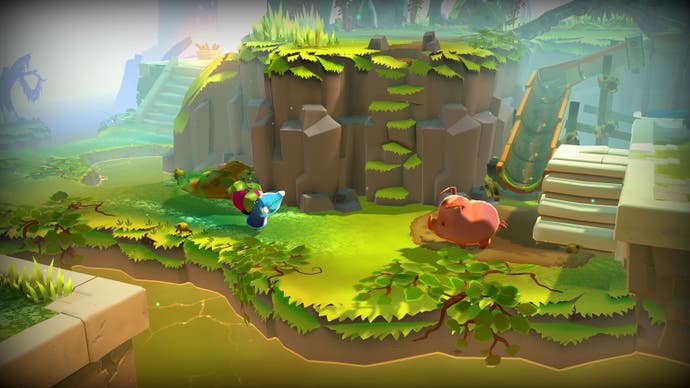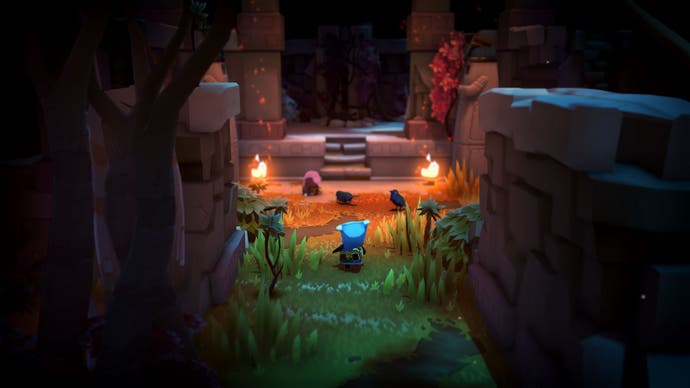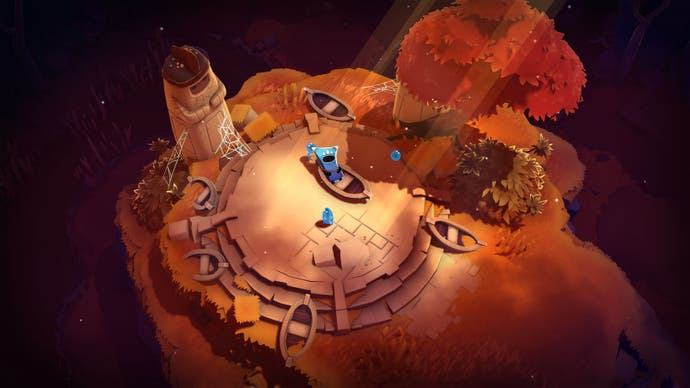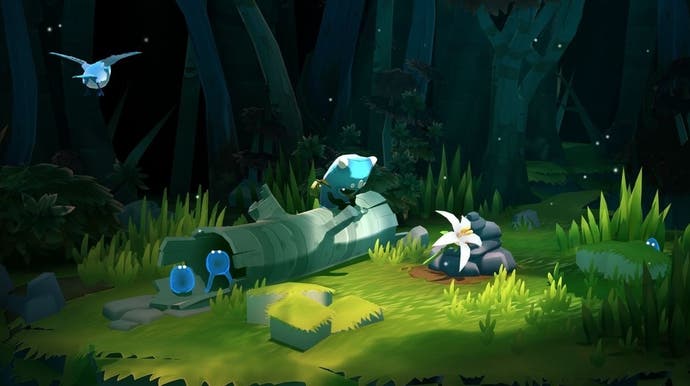Chasing the dream of four people in a room
Hello Games' Sean Murray and Steven Burgess on The Last Campfire, No Man's Sky, and coming full circle.
It's easy to forget there was life before No Man's Sky at Hello Games. The studio, which is still small now, started out tiny: "four people in a room" as co-founder Sean Murray puts it, somewhat wistfully, when the original team started work on the PS3's Joe Danger. Speaking to Murray and Steven Burgess, who's taking the lead on The Last Campfire, the curiously mournful puzzle-adventure that arrived via surprise release yesterday, the focus is very much on that kind of independent spirit.
There's some nostalgia there, when Murray talks over the studio's history, starting with the now-familiar story of the humble Joe Danger roots and how the team quickly ballooned to "15 or 16" people on No Man's Sky at the peak, before settling on the 25 that make up the internal Hello Games team now. But the core team's not the one working on The Last Campfire. Burgess, alongside Chris Symonds and James Chilcott, make up the entirety of The Last Campfire team. The main bulk of the Hello Games team is on something else entirely.

The setup now is all a bit full-circle. Burgess and Symonds were on "a smallish team" of about 18 people within a much larger one at Frontier Developments when their previous game, 2008's LostWinds, was in progress. After that, it was more or less solely Burgess that headed up the work on porting Hello Game's own small-team game Joe Danger to iOS ("We worked on that together, but Stevie did all the work," Murray half-jokes).
"The kind of thing the devil would come to you at midnight with..."
Sean Murray, on No Man's Sky's runaway success.
Joe Danger came out on consoles and PC of course but "really found its success," Murray says, on iOS with Joe Danger Touch. And now they're back, "an even smaller team within an even smaller team," as Burgess puts it, making The Last Campfire. Murray himself is keen to play that symmetry up, talking with some nostalgia of the micro-studio indie days and the intention to try and replicate it "as much as possible. We want people to have that experience and I think that's important and hopefully does feel different" to working in a larger team.
"We wanted to give other people in the studio the opportunity to have that experience that we had," he explains, "because I think that was very formative for us and we didn't want to just be, you know, four old farts telling people 'well on Joe Danger this happened,' even though we're still that, obviously. But hopefully we are bringing up the next round of old farts, with the Campfire team. There's three guys, and there's a whole bunch of extra help outside of that, but they're really the developers working on the game.
"The guys are in their own office, this is very much [a situation where] we're trying to replicate all the... all the 'fun of being an indie studio'," he laughs. "Whilst hopefully still getting paid a wage and all of those kinds of things that mean that you're not putting your life on the line either."
There's a qualitative argument to be made for that kind of setup, as Murray does: "So for instance, art wise, a thing I loved about Joe Danger was that you could look at it and every bit of art has been made by our artist Grant [Duncan], you were looking at - or sort of stepping into - his imagination, and he just had complete control. It's the same on Campfire, it's a lovely feeling." But reading between the lines there's another reason for it, really, which is the long shadow cast over Hello Games by the stratospheric launch of No Man's Sky, and the subsequent shift away from that micro-studio spirit that it required.
"I think No Man's Sky was a... a crazy ol' journey," Murray says when I bring it up - and ask if there have been any lessons learned, so to speak, from what some would call a touch of overpromising in the lead up to its tumultuous launch. It was "a game that I think from the moment that we announced it, became a rocket ship, you know, straight to the Sun all the way up.

"I think every developer would accept that kind of journey as a kind of a mixed blessing, right? I think most developers would be like 'it's signing a deal with the devil,' to accept that you're going to have everyone in the world interested in playing it. It's the kind of thing that the devil would come to you at midnight with, right? A contract that would be like: you will be one of the biggest selling IPs of this generation, you're going to be on stage at E3, and have all these, you know, incredible adoring fans. And then you would realise that there are some difficulties with that. Campfire's a very different proposition."
The final piece of the cyclical puzzle, here, is Apple. The Last Campfire's coming out on just about every platform under the Sun, but - and I should add that this conversation was taking place with someone from Apple on the line, as Murry himself did jokingly - Murray was keen to emphasise how it was actually developed with iOS in mind. "It has a very native feel to it. We were developing for iOS for like five years, our very first builds were on that, so whilst we've adapted it for other platforms, and I'm really proud of that, one of the things that I am most proud of, in particular, is that it feels so at home on iOS. That was a big thing for us from day one."
For Murray it was "a meeting of minds," about the type of game The Last Campfire team wanted to make, as well as what a platform could be about. Referring to a question I asked about the market for these types of indie games - a silent, besmocked character wandering through an enchanted forest, and so on - and whether some might claim it to be a tad crowded, he added: "You may say, "Oh, the market is saturated," but I think actually, on iOS, there is an open space to kind of tell really nice, complete stories. "So it was lovely to be approached by Apple, and kind of a good meeting of minds on Arcade with what they wanted to do there in trying to push 'premium quality', complete titles on iOS."

"Having said that, we want Campfire to stand out amongst that field and be something... something different and also something that feels deeply at home on iOS." He emphasises the fact that much of the marketing so far has placed emphasis on the atmosphere, over the real experience. "If you look at its contemporaries of Abzu, or Journey, or Brothers [A Tale of Two Sons] or whatever, there is room for many stories in that style... Campfire, at its heart, is a puzzle game and it has probably a higher density of puzzle gameplay - and gameplay variety across it - than people are probably expecting from the trailers they've seen so far, which tend to focus on the evocative."
Putting the pieces together, though, above all The Last Campfire just seems like a chance for the studio to reset, after the freneticism of the last thing it launched. It seems a conscious attempt at getting away from the bigger team, bigger spotlight development, even if Murray himself and the core No Man's Sky team is focusing on something else. "We're working on something new, ambitious, that's kind of unannounced, and we're working on No Man's Sky," was all Murray would say. I wonder if he, in particular, will still crave a bit of the spotlight, now the worst of it's died down, but for now he and the team just seem glad for the change of pace. "We're kind of very happy," Murray says, "I suppose, with where we are now."
(Correction: due to a transcription error this article previously stated Hello Games reached 50 or 60 people in size, when in fact it was 15 or 16. Apologies from us, and the article's been updated!)



